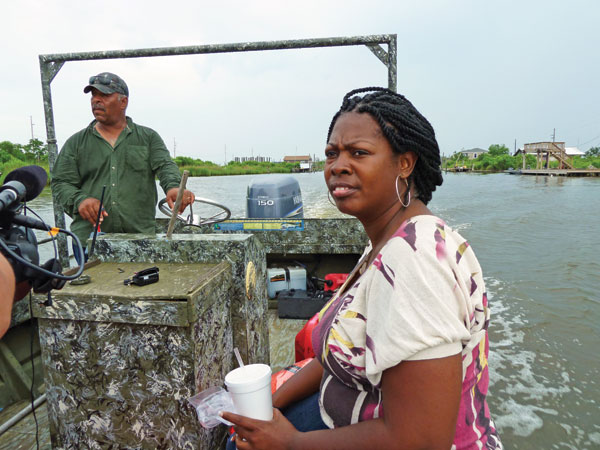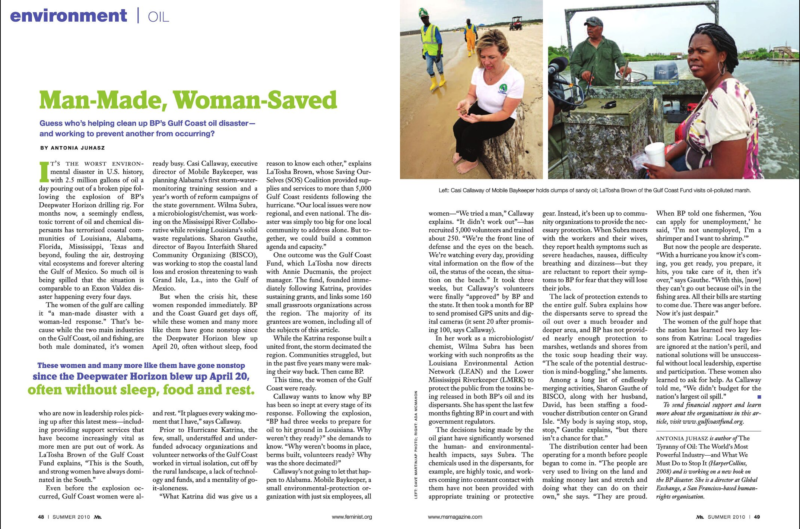The Women Who Won’t Abandon The Gulf.

 The government says that the millions of barrels of oil spilled into the Gulf are “dissipating.” But environmentalists warn about long-term effects. Does the “Mission Accomplished” rhetoric mean BP and the feds are bailing?
The government says that the millions of barrels of oil spilled into the Gulf are “dissipating.” But environmentalists warn about long-term effects. Does the “Mission Accomplished” rhetoric mean BP and the feds are bailing?
Not if Gulf women have anything to say about it.
Antonia Juhasz reports on the coalitions of women politicized by Hurricane Katrina who are working hard to save the Gulf and its people. Excerpted from the Summer 2010 issue of Ms. magazine.
—————————-
It’s the worst environmental disaster in U.S. history, with 2.5 million gallons of oil a day pouring out of a broken pipe following the explosion of BP’s Deepwater Horizon drilling rig. For months now, a seemingly endless, toxic torrent of oil and chemical dispersants has terrorized coastal communities of Louisiana, Alabama, Florida, Mississippi, Texas and beyond, fouling the air, destroying vital ecosystems and forever altering the Gulf of Mexico. So much oil is being spilled that the situation is comparable to an Exxon Valdez disaster happening every four days.
The women of the gulf are calling it “a man-made disaster with a woman-led response.” That’s because while the two main industries on the Gulf Coast, oil and fishing, are both male-dominated, it’s women who are now in leadership roles picking up after this latest mess—including providing support services that have become increasingly vital as more men are put out of work. As LaTosha Brown of the Gulf Coast Fund explains, “This is the South, and strong women have always dominated in the South.”
Even before the explosion occurred, Gulf Coast women were already busy. Casi Callaway, executive director of Mobile Baykeeper, was planning Alabama’s first storm-water-monitoring training session and a year’s worth of reform campaigns of the state government. Wilma Subra, a microbiologist/chemist, was working on the Mississippi River Collaborative while revising Louisiana’s solid waste regulations. Sharon Gauthe, director of Bayou Interfaith Shared Community Organizing (BISCO), was working to stop the coastal land loss and erosion threatening to wash Grand Isle, La., into the Gulf of Mexico.
But when the crisis hit, these women responded immediately. BP and the Coast Guard get days off, while these women and many more like them have gone nonstop since the Deepwater Horizon blew up April 20, often without sleep, food and rest. “It plagues every waking moment that I have,” says Callaway.
Prior to Hurricane Katrina, the few, small, understaffed and under-funded advocacy organizations and volunteer networks of the Gulf Coast worked in virtual isolation, cut off by the rural landscape, a lack of technology and funds, and a mentality of go-it-aloneness.
“What Katrina did was give us a reason to know each other,” explains LaTosha Brown, whose Saving Our-Selves (SOS) Coalition provided supplies and services to more than 5,000 Gulf Coast residents following the hurricane. “Our local issues were now regional, and even national. The disaster was simply too big for one local community to address alone. But together, we could build a common agenda and capacity.”
One outcome was the Gulf Coast Fund, which LaTosha now directs with Annie Ducmanis, the project manager. The fund, founded immediately following Katrina, provides sustaining grants, and links some 160 small grassroots organizations across the region. The majority of its grantees are women, including all of the subjects of this article.
While the Katrina response built a united front, the storm decimated the region. Communities struggled, but in the past five years many were making their way back. Then came BP.
This time, the women of the Gulf Coast were ready.
Callaway wants to know why BP has been so inept at every stage of its response. Following the explosion, “BP had three weeks to prepare for oil to hit ground in Louisiana. Why weren’t they ready?” she demands to know. “Why weren’t booms in place, berms built, volunteers ready? Why was the shore decimated?”
Callaway’s not going to let that happen to Alabama. Mobile Baykeeper, a small environmental-protection organization with just six employees, all women — “We tried a man,” Callaway explains. “It didn’t work out” — has recruited 5,000 volunteers and trained about 250. “We’re the front line of defense and the eyes n the beach. We’re watching every day, providing vital information on the flow of the oil, the status of the ocean, the situation on the beach.” It took three weeks, but Callaway’s volunteers were finally “approved” by BP and the state. It then took a month for BP to send promised GPS units and digital cameras (it sent 20 after promising 100, says Callaway).
In her work as a microbiologist/chemist, Wilma Subra has been working with such nonprofits as Louisiana Environmental Action Network (LEAN) and the Lower Mississippi Riverkeeper (LMRK) to protect the public from the toxins being released in both BP’s oil and its dispersants. She has spent the last few months fighting BP in court and with government regulators.
The decisions being made by the oil giant have significantly worsened the human- and environmental-health impacts, says Subra. The chemicals used in the dispersants, for example, are highly toxic, and workers coming into constant contact with them have not been provided with appropriate training or protective gear. Instead, it’s been up to community organizations to provide the necessary protection. When Subra meets with the workers and their wives, they report health symptoms such as severe headaches, nausea, difficulty breathing and dizziness — but they are reluctant to report their symptoms to BP for fear that they will lose their jobs.
The lack of protection extends to the entire gulf. Subra explains how the dispersants serve to spread the oil out over a much broader and deeper area, and BP as not provided nearly enough protection to marshes, wetlands and shores from the toxic soup heading their way. “The scale of the potential destruction is mind-boggling,” she laments.
Among a long list of endlessly merging activities, Sharon Gauthe of BISCO, along with her husband, David, has been staffing a food-voucher distribution center on Grand Isle. “My body is saying stop, stop, stop,” Gauthe explains, “but there isn’t a chance for that.”
The distribution center had been operating for a month before people began to come in. “The people are very used to living on the land and making money last and stretch and doing what they can on their own,” she says. “They are proud. When BP told one fisherman, ‘You can apply for unemployment,’ he said, ‘I’m not unemployed, I”m a shrimper and I want to shrimp.’”
But now the people are desperate. “With a hurricane you know it’s coming, you get ready, you prepare, it hits, you take care of it, then it’s over,” says Gauthe. “With this, [now] they can’t go out because oil’s in the fishing area. All their bills are starting to come due. There was anger before. Now it’s just despair.”
The women of the gulf hope that the nation has learned two key lessons from Katrina: Local tragedies are ignored at the nation’s peril, and national solutions will be unsuccessful without local leadership, expertise and participation. These women also learned to ask for help. As one told me, “We didn’t budget for the nation’s largest oil spill.”

